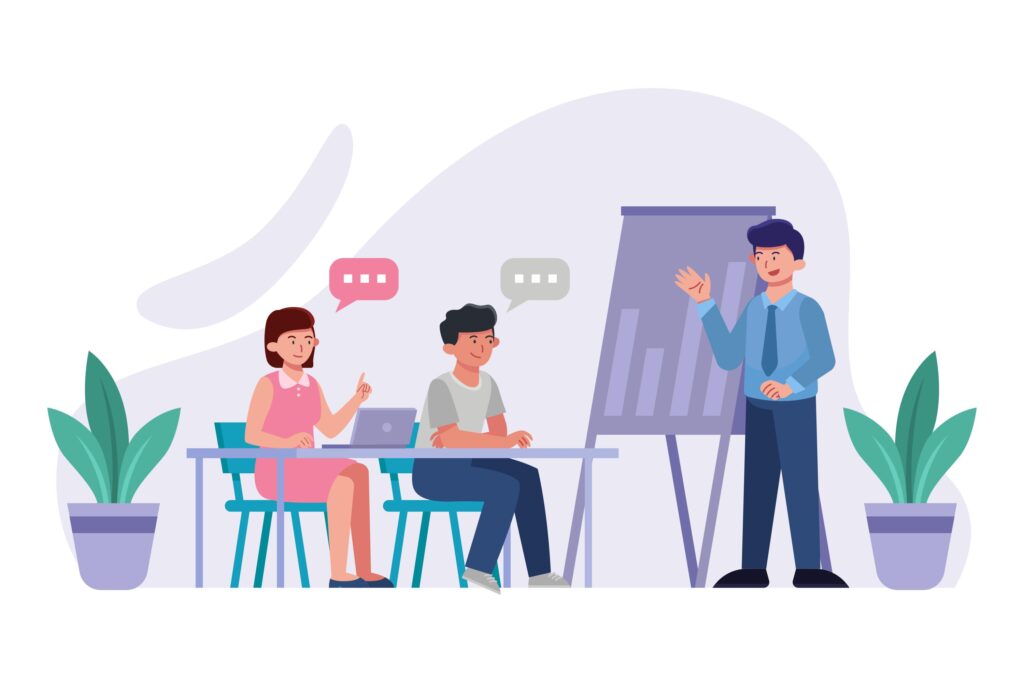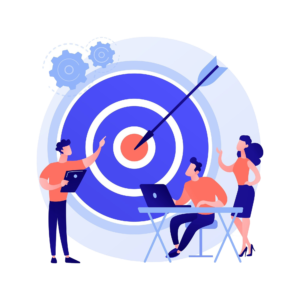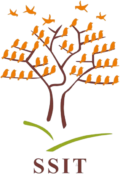Training & Placement Department
Overview
The Training and Placement (T&P) Department serves as a pivotal bridge between students and the corporate world. It focuses on enhancing students’ employability by providing them with comprehensive training in soft skills, technical skills, and industry-specific knowledge. The department organizes various activities such as workshops, mock interviews, aptitude tests, and internships to prepare students for real-world challenges. Additionally, it collaborates with companies to facilitate campus recruitment drives, ensuring that students have ample opportunities to secure employment in reputed organizations. The T&P Department also maintains strong industry connections to stay updated with the latest trends and demands, aligning the curriculum and training programs accordingly to meet the evolving needs of the job market.
Training & Placement Coordinator:
Mrs. Swati Deshmukh
Contact Details:
tpssitngp@gmail.com
tp@ssitngp.com
8888809492


- The develop well-rounded individuals who can effectively handle the complexities of the modern workplace and contribute positively to society.

- To Enhance Communication Skills
- To Develop Leadership Qualities
- To Foster Professionalism
- To Improve Presentation Skills
- To build Self-Confidence
- To Provide Career Guidance
- To Encourage Adaptability
Semester wise Planning of T and P Activity
- Third Semester
- Fourth Semester
- Fifth Semester
- Sixth Semester
- Seventh Semester
- Eighth Semester
- Orientation Session:
Introduction to Training & Placement Department
- Objectives of T & P Department
- Functions of T & P Department
- Importance of T & P Department
- Planning of activities to be done under the T & P Department.
- Soft Skills Sessions/Workshops: Activities to be done to improve soft skills like communication, teamwork, leadership etc.
- Industry Visits: Visits to industries or companies to understand real-world engineering applications.
- Alumni Talks: Sessions with alumni who have successfully transitioned into the industry, sharing their experiences and tips.
- Internship: Information sessions on finding and applying for internships opportunities.
- Soft Skill Development: Workshops on Communication skills, teamwork, and leadership.
- Group Discussions: Sessions to improve interpersonal skills, confidence and group dynamics.
- Guest Lectures: Talks by industry experts on career paths and industry expectations.
- Aptitude Training: Workshops/Sessions on basic aptitude training.
- Resume Building Sessions/Workshop: Develop an outlook to craft a strong resume through academic achievements, relevant coursework, internships, projects, extracurricular activities.
- Alumni Talks: Sessions with alumni who have successfully transitioned into the industry, sharing their experiences and tips
- Certifications: Encouraging students to pursue relevant certification courses
- Networking Events: Meet and greet sessions with alumni and industry professionals.
- Debate Competition: Organising Debate Competition to improve Public Speaking, Critical Thinking, Open-Mindedness.
- Aptitude Training: Sessions on advance aptitude training.
- Mock Interviews: Practice interviews with feedback from professionals
- Career Counselling: One-on-one counselling sessions to help students identify their career goals and paths.
- Alumni Talks: Sessions with alumni who have successfully transitioned into the industry, sharing their experiences and tips
- Soft Skills Sessions/Workshops: Activities to be done to improve soft skills like communication, teamwork, leadership etc.
- Aptitude Training: Workshops/Sessions on quantitative aptitude, logical reasoning, and verbal ability.
- Personality Development: Workshops/Sessions on building confidence, time management, and stress management.
- Industry Panels: Discussions with panels of industry experts on current challenges and innovations.
- Career Counselling: One-on-one counselling sessions to help students identify their career goals and paths.
- Alumni Talks: Sessions with alumni who have successfully transitioned into the industry, sharing their experiences and tips
- Advanced Resume Workshop: Tailoring resumes for specific job roles and industries.
- Internship Opportunities: Facilitating short-term internships or project work.
- Soft Skills Sessions/Workshops: Activities to be done to improve soft skills like communication, teamwork, leadership etc.
- Pre-Placement Training: Intensive preparation for campus recruitment processes, including mock interviews, group discussions, and aptitude tests. Career Counselling: One-on-one counselling sessions to help students identify their career goals and paths.
- Aptitude Training: Workshops/Sessions on quantitative aptitude, logical reasoning, and verbal ability.
- Job Fair Participation: Preparation and participation in local job fairs and recruitment events.
- Soft Skills Sessions/Workshops: Activities to be done to improve soft skills like communication, teamwork, leadership etc.
- Mock Interviews: Practice interviews with feedback from professionals
- Higher Studies Guidance: Information sessions on pursuing higher studies, both domestic and international, including entrance exam preparation (GRE, GATE, TOEFL, etc.).
- Group Discussion Conduction: Facilitation of practice group discussions to develop students’ communication skills, critical thinking, and ability to articulate thoughts clearly while collaborating effectively in a team setting.
- HR Session: Interactive sessions with HR professionals to educate students on interview etiquette, body language, and answering behavioural questions, providing insights into what employers look for during the hiring process.
- Final Placement Drives: Coordinating with companies for final-year recruitment.
- Entrepreneurship Workshops: Encouraging entrepreneurial skills and providing resources for startup ideas.
- Exit Interviews: Conducting exit interviews to gather feedback and improve the Training & Placement processes.
- Company-Specific Training: Training sessions tailored to the requirements of specific companies visiting for campus placements.
Our Recruiters













Placed Students | ||||
| SR. NO. | PHOTOGRAPH | NAME OF STUDENT | QUALIFICATION | GENDER |
| 1 | DRUMANSHU MAHENDRA NANDANWAR | MBA | MALE | |
| 2 | NISHITA KISHOR GIRADKAR | MBA | FEMALE | |
| 3 | PRACHI MUNESHWAR TOPRE | MBA | FEMALE | |
| 4 | PRAJAKTA MANOHAR MOTGHARE | MBA | FEMALE | |
| 5 | RESHMA PRAKASH NIMJE | MBA | FEMALE | |
| 6 | RUPALI SURYABHAN PAUNIKAR | MBA | FEMALE | |
| 7 | SOKHI SATWINDER SINGH RAJENDRA SINGH | MBA | MALE | |
| 8 | SAKSHI KALIDAS KARHADE | MBA | FEMALE | |
| 9 | SHYVEE BADGE | MBA | FEMALE | |
| 10 | ASHISH SOLANKI | MBA | MALE | |
| 11 | TEJASHRI MESHRAM | MBA | FEMALE | |
| 12 | DIKSHA BAHARGHARE | MBA | FEMALE | |
| 13 | AARTI DHAKATE | MBA | FEMALE | |
| 14 | AARTI WATTIGHARE | MBA | FEMALE | |
| 15 | PANKAJ BANGDE | MBA | MALE | |
| 16 | PALLAVI KEDAR | MBA | FEMALE | |
B.Tech Students in Academic Year 2023-24













Number of placement of outgoing students of all branches during the year 2023-24 | ||||
| Sr. No. | Year | Name of student placed and contact details | Program graduated from | Name of the Employer |
| 1 | 2023-24 | Abhay Patle | Civil Engineering | Larsen & Toubro Limited |
| 2 | 2023-24 | Dhananjay Gokhale | Civil Engineering | Larsen & Toubro Infrastructure |
| 3 | 2023-24 | Ankit Jibhakate | Civil Engineering | Larsen & Toubro Infrastructure |
| 4 | 2023-24 | Jayshri Parwate | Civil Engineering | Digimedia Solution Pvt. Ltd |
| 5 | 2023-24 | Rohit Yadav | Civil Engineering | Larsen & Toubro Infrastructure |
| 6 | 2023-24 | Nikita Guruprasad Adikari | Mechanical Engineering | Hindalco Industries Ltd. Mumbai |
| 7 | 2023-24 | Manishkumar Rewatkar | Mechanical Engineering | Explotech Engineer Pvt.Ltd. Nagpur |
| 8 | 2023-24 | Chanchal Komal Navghare | Electronics and Telecommunication Engineering | Mendiratta Business Solution Pvt. Ltd (Sr. Associate ) Pune |
| 9 | 2023-24 | Yash Sanjay Dhabekar | Electronics and Telecommunication Engineering | Rawmatt Industries Pvt. Ltd, Nagpur |
| 10 | 2023-24 | Dipak C. Bawankule | Electronics and Telecommunication Engineering | Rawmatt Industries Pvt. Ltd, Nagpur |
| 11 | 2023-24 | Shantanu Haribhau Talmale | Electronics and Telecommunication Engineering | Trust Systems & Software Pvt. Ltd (Tester), Nagpur |
| 12 | 2023-24 | Muhammad Huzaifa Mohammad Chand | Computer Engineering | HCL,Noida |
| 13 | 2023-24 | Ranjeet Maroti Zade | Computer Engineering | Code Fever Technology Pvt. Ltd Chandrapur |
| 14 | 2023-24 | Drumanshu Mahendra Nandanwar | MBA | SMART SHIFT LOGISTIC PVT LTD |
| 15 | 2023-24 | Nishita Kishor Giradkar | MBA | SUCCESS STUDY POINT |
| 16 | 2023-24 | Prachi Muneshwar Topre | MBA | INDIAN TRADERS CORPORATION |
| 17 | 2023-24 | Prajakta Manohar Motghare | MBA | TECHFIN INNOVA PVT LTD |
| 18 | 2023-24 | Reshma Prakash Nimje | MBA | S.B.HALLMARKING CENTRE |
| 19 | 2023-24 | Rupali Suryabhan Paunikar | MBA | CS AVINASH GANDHEWAR & ASSOCIATES |
| 20 | 2023-24 | Sokhi Satwinder Singh Rajendra Singh | MBA | CLIENT CURVE |
| 21 | 2023-24 | Sakshi Kalidas Karhade | MBA | k-blossom school |
| 22 | 2023-24 | Shyvee Badge | MBA | IBRANIC PVT LTS |
| 23 | 2023-24 | Ashish Solanki | MBA | HALDIRAM SNACKS PVT LTD |
| 24 | 2023-24 | Tejashri Meshram | MBA | DAR_V COMPANY |
| 25 | 2023-24 | Diksha Baharghare | MBA | SGM OFFSET |
| 26 | 2023-24 | Aarti Dhakate | MBA | DAR_V COMPANY |
| 27 | 2023-24 | Aarti Wattighare | MBA | DAR_V COMPANY |
| 28 | 2023-25 | Pankaj Bangde | MBA | BrainZ1 Techhub |
| 29 | 2023-26 | Pallavi Kedar | MBA | Axis Bank |
T & P Module
1. Remembering, 2. Understanding, 3. Applying, 4. Analyzing, 5. Evaluating, 6. Creating.
We use Bloom’s Taxonomy to ensure that our teaching and assessment methods promote higher-order thinking skills and facilitate deep learning. By aligning instructional strategies with the appropriate level of cognitive complexity, we effectively support students’ intellectual development and mastery of course content. These 6 levels can be used to structure the learning outcomes, lessons, and assessments of course.
Also,
1. Cognitive, 2. Affective, and 3. Psychomotor are three domains of learning that represent different aspects of human behaviour and skills.
We have approximately 80 hours to achieve the above objectives in a full session. Basic level aptitude and reasoning questions will be also practiced during these 80 hours. The division of these 80 hours is as follows:
1. Communication Skills: (16 Hours)
Assess how effectively the student communicates ideas, both verbally and in writing. This includes clarity, confidence, and the ability to articulate technical concepts to various audiences.
2. Professional Etiquette: (16 Hours)
Consider their knowledge and application of professional etiquette, including appropriate dress, manners, and communication in professional settings such as interviews, meetings, and networking events.
3. Adaptability and Resilience: (16 Hours)
Evaluate their ability to adapt to change, handle setbacks, and persevere in the face of challenges. This could involve assessing their response to failure, feedback, or unexpected obstacles.
4.Teamwork and Collaboration: (16 Hours)
Evaluate their ability to work effectively in teams, including communication within the team, contribution to group discussions, and willingness to collaborate with others.
5. Leadership Potential: (16 Hours)
Look for signs of leadership qualities such as initiative, responsibility, and the ability to motivate and inspire others. This could include involvement in extracurricular activities, projects, or volunteer work where they have taken on leadership roles.
Overall Presentation: Assess their overall demeanour, confidence, and presence. This includes factors such as grooming, body language, and overall presentation, which can leave a lasting impression in academic and professional contexts.
We can achieve our objectives through some of the following simple activities.
1.Activities for developing communication skills
Some general research topics suitable for engineering students to present their findings:
1.Renewable Energy Technologies: Explore the latest advancements and potential applications of solar, wind, hydro, or other renewable energy sources.
2.Smart Cities and Infrastructure: Investigate the integration of IoT devices, data analytics, and automation in improving urban infrastructure efficiency and sustainability.
3.Biomedical Engineering Innovations: Research recent developments in medical devices, prosthetics, tissue engineering, or healthcare technologies.
4.Advanced Materials: Examine novel materials such as graphene, nano-materials, or composites, and their applications in various industries.
5.Artificial Intelligence in Engineering: Explore the use of AI and machine learning algorithms for optimization, predictive maintenance, or autonomous systems in engineering.
6.Sustainable Transportation: Investigate alternative fuels, electric vehicles, or innovative transportation systems to reduce environmental impact.
7.Water Resource Management: Study techniques for water purification, wastewater treatment, or efficient water usage in agriculture and industry.
8.Space Exploration Technologies: Research recent advancements in rocket propulsion, satellite technology, or space habitat design for future space missions.
9.Cybersecurity in Critical Infrastructure: Analyze methods to protect essential systems such as power grids, transportation networks, or communication systems from cyber threats.
10.Robotics and Automation: Explore applications of robotics in manufacturing, agriculture, healthcare, or service industries, focusing on advancements in autonomy and efficiency.
For engineering students, it’s beneficial to provide complex texts or articles that align with their field of study while also challenging them intellectually.
When selecting texts for these activities, it’s essential to consider the students’ level of expertise and interests, as well as the relevance of the content to their academic or professional goals. Additionally, providing a variety of text types can help students develop diverse skills in summarizing and analyzing complex engineering concepts.
- Here are some debate topics suitable for engineering students:
- Ethical considerations in artificial intelligence development: Should there be stricter regulations on AI research and implementation to prevent potential harm to society?
- Renewable energy vs. fossil fuels: Which should be prioritized in future energy policies?
- Space exploration funding: Should governments allocate more funding to space exploration or focus on solving issues on Earth?
- The role of 5G technology in shaping the future: Is it worth the investment and potential health risks?
- Ethical implications of gene editing technologies: Should there be limitations on genetic engineering?
- The importance of cybersecurity in the digital age: How can we better protect our data and privacy?
- The impact of automation on the job market: Will robots and AI create more jobs than they eliminate?
- Sustainable infrastructure development: How can engineering projects contribute to environmental conservation?
- The ethics of autonomous vehicles: Who should be held responsible in case of accidents?
- The future of space colonization: Is it feasible and ethical to colonize other planets?
- The use of drones in civilian life: What are the potential benefits and risks?
- The role of engineers in addressing climate change: How can engineering innovations mitigate the effects of global warming?
- The ethics of gene patenting: Should companies be allowed to patent genetic sequences?
- The impact of 3D printing on manufacturing industries: Will it revolutionize production processes?
- Net neutrality: Should internet service providers be allowed to control access to certain websites and services?
These topics should provide a good starting point for debates among engineering students, touching on both technical and ethical aspects of engineering and technology.
- Topics suitable for group discussions:
- Sustainable Engineering Practices: Balancing development with environmental preservation.
- Artificial Intelligence and Automation in Engineering: Opportunities and challenges.
- Renewable Energy Technologies: Advancements and implementation strategies.
- The Role of Engineering in Addressing Climate Change: Mitigation and adaptation strategies.
- Ethical Considerations in Engineering: Balancing technological advancements with social responsibility.
- Future of Transportation: From electric vehicles to hyperloop technology.
- Smart Cities: Integration of technology for urban development and management.
- Biomedical Engineering Innovations: Improving healthcare through technology.
- Cybersecurity in Engineering Systems: Ensuring the safety and integrity of digital infrastructure.
- Industry 4.0: The impact of IoT, big data, and robotics on manufacturing processes.
- Challenges in Civil Engineering: Infrastructure development and maintenance.
- Space Exploration and Engineering: Opportunities and challenges in space technology.
- Engineering Education: Innovations in teaching methods and curriculum development.
- Innovations in Material Science: New materials for various engineering applications.
- Humanitarian Engineering: Using engineering skills for social good and community development.
Role-Playing Scenarios: Create role-playing scenarios where students assume different roles within an engineering team or project. Assign specific roles such as project manager, technical lead, client representative, and require students to communicate effectively with each other to achieve project objectives. Encourage students to practice active listening, negotiation, and persuasion skills as they navigate the scenario.
Cognitive Domain:
- 1. Research and Presentations: Conduct research on a topic of interest and prepare a presentation to share findings with others. This activity involves gathering information, analyzing data, and organizing thoughts logically.
- Critical Reading and Writing: Read complex texts or articles and write summaries or analysis papers. This activity helps develop comprehension skills, critical thinking, and the ability to articulate thoughts clearly in writing.
- Debates and Discussions: Participate in debates or group discussions on various topics. This activity requires participants to formulate arguments, consider different viewpoints, and communicate their ideas persuasively.
- Problem-solving Scenarios: Engage in problem-solving activities or case studies where effective communication is necessary to identify issues, brainstorm solutions, and communicate findings to others.
Affective Domain:
- Active Listening Exercises: Practice active listening by participating in exercises where individuals take turns sharing their thoughts and experiences while others listen attentively without interrupting. This activity fosters empathy, respect, and understanding.
- Role-playing: Engage in role-playing scenarios where participants take on different roles and interact with each other to simulate real-life communication situations. This activity helps develop empathy, perspective-taking, and interpersonal skills.
- Feedback and Reflection: Provide and receive constructive feedback on communication skills from peers or mentors. Encourage reflection on communication strengths and areas for improvement, fostering self-awareness and a growth mindset.
- Cross-cultural Communication: Engage in activities that promote understanding and appreciation of cultural differences in communication styles and norms. This can include exploring cultural differences through case studies, role-playing, or cultural immersion experiences.
Psychomotor Domain:
- Public Speaking Practice: Practice delivering speeches or presentations in front of a mirror or small group to improve vocal delivery, body language, and overall presentation skills.
- Non-verbal Communication Exercises: Engage in activities that focus on non-verbal communication skills, such as maintaining eye contact, using gestures effectively, and controlling facial expressions.
- Interview Simulations: Participate in mock interviews where individuals practice responding to interview questions, showcasing their communication skills under pressure and receiving feedback on areas for improvement.
- Technology-based Communication Training: Utilize technology tools such as video conferencing platforms or presentation software to practice virtual communication skills, including screen sharing, digital presentations, and online collaboration.
2.Activities for developing Professional Etiquette:
- Arrange mock interviews where students dress professionally and practice answering common interview questions. Provide feedback on their communication skills, body language, and overall professionalism.
- Assign tasks where students draft professional emails for various purposes, such as reaching out to potential employers, following up after interviews, or communicating with colleagues. Review and discuss the emails to provide guidance on tone, clarity, and professionalism.
- Assign group projects that require students to work collaboratively and communicate effectively with team members. Emphasize the importance of respecting diverse perspectives, listening actively, and resolving conflicts professionally.
- Offer opportunities for students to practice public speaking, whether through presentations, debates, or elevator pitches. Provide constructive feedback on their delivery, organization of ideas, and ability to engage the audience.
- Host seminars on topics such as time management, stress management, conflict resolution, and workplace ethics.
- Organize etiquette dinners where students learn proper dining etiquette in a professional setting. Teach them about table manners, conversation etiquette, and the nuances of business dining.
- By engaging in these activities, engineering students can enhance their professional etiquette and prepare themselves for success in their future careers.
Cognitive Domain:
- Researching Professional Norms: Conduct research on professional norms, etiquette, and protocols in specific industries or cultural contexts. This activity involves gathering information from reputable sources, such as books, articles, or online resources, to understand the expectations of professional behaviour.
- Case Studies and Scenarios: Analyze case studies or scenarios depicting various professional dilemmas or etiquette challenges. Participants can discuss and brainstorm appropriate responses based on their understanding of professional norms and ethical principles.
- Role-playing Work Situations: Engage in role-playing exercises where participants simulate common workplace interactions, such as client meetings, networking events, or job interviews. This activity helps individuals practice applying professional etiquette in realistic scenarios.
- Writing Professional Emails: Practice composing professional emails addressing different stakeholders, such as clients, colleagues, or supervisors. Participants can focus on clarity, tone, and adherence to formal writing conventions.
Affective Domain:
- Self-reflection on Professional Values: Encourage individuals to reflect on their personal values and how they align with professional ethics and etiquette. This activity promotes introspection and self-awareness regarding attitudes and behaviours in professional settings.
- Empathy and Respect Exercises: Engage in activities that promote empathy and respect for others’ perspectives and boundaries in professional interactions. This can include exercises on active listening, perspective-taking, and recognizing diverse viewpoints.
- Cultural Sensitivity Training: Participate in workshops or discussions focused on cultural diversity and sensitivity in the workplace. This activity fosters awareness and appreciation of cultural differences in communication styles, etiquette norms, and social customs.
- Team-building Activities: Engage in team-building exercises that emphasize trust, collaboration, and mutual respect among team members. Building positive interpersonal relationships is essential for practicing professional etiquette within a team setting.
Psychomotor Domain:
- Handshake and Introductions Practice: Practice proper handshake techniques and introductions in simulated networking or professional settings. Participants can focus on factors such as firmness, eye contact, and verbal greetings.
- Dress Code Demonstrations: Conduct demonstrations or workshops on appropriate attire for different professional settings, such as business casual, formal, or business professional. Participants can learn how to dress appropriately to convey professionalism and respect.
- Table Manners and Dining Etiquette: Participate in dining etiquette workshops or mock business meals where individuals practice proper table manners, conversation etiquette, and handling dining utensils gracefully.
- Presentation Skills Training: Practice delivering professional presentations or pitches with a focus on effective communication, body language, and confidence. Participants can receive feedback on their presentation skills and areas for improvement.
3.Activities for developing Adaptability and Resilience
Assign problem-solving challenges that require students to think creatively and adapt to changing circumstances. Provide scenarios where initial solutions may not work, requiring students to adjust their approach and persevere until they find a viable
Create simulated engineering projects or scenarios where students encounter unexpected obstacles, resource constraints, or changes in requirements. Encourage them to adapt their plans, prioritize tasks, and collaborate effectively to overcome challenges.
Analyze case studies of real-world engineering projects that faced setbacks, delays, or unexpected complications. Facilitate discussions on how engineers responded to adversity, adapted their strategies, and ultimately achieved success.
Organize workshops where students analyze engineering failures and learn valuable lessons from past mistakes. Emphasize the importance of resilience in bouncing back from setbacks, learning from failures, and implementing improvements to prevent similar issues in the future.
By engaging in these activities, engineering students can cultivate the adaptability and resilience needed to thrive in their academic pursuits and future engineering careers.
Cognitive Domain:
- Problem-solving Challenges: Engage in problem-solving activities or puzzles that require participants to think critically, analyze situations, and devise creative solutions. This activity helps develop cognitive flexibility and the ability to adapt to new challenges.
- Scenario Planning Exercises: Work through hypothetical scenarios or case studies depicting unexpected events or changes in circumstances. Participants can brainstorm strategies and contingency plans to adapt and respond effectively to these situations.
- Decision-making Simulations: Participate in decision-making simulations where individuals must make quick and informed decisions under pressure. This activity helps develop cognitive agility and the ability to navigate uncertainty with confidence.
- Learning New Skills: Take on opportunities to learn new skills or acquire knowledge in different areas. This could involve enrolling in courses, attending workshops, or seeking mentorship to broaden one’s skill set and adapt to evolving demands.
Affective Domain:
- Stress Management Techniques: Practice stress management techniques such as deep breathing, mindfulness meditation, or progressive muscle relaxation. Participants can learn to recognize signs of stress and develop coping strategies to build emotional resilience.
- Growth Mindset Workshops: Participate in workshops or discussions focused on cultivating a growth mindset, emphasizing the belief that challenges are opportunities for growth and learning. This activity fosters a positive attitude towards adversity and encourages perseverance.
- Resilience-building Exercises: Engage in activities that promote resilience-building, such as journaling about past experiences of overcoming challenges, sharing stories of resilience with peers, or reflecting on personal strengths and resources.
- Self-care Practices: Prioritize self-care activities such as exercise, adequate sleep, healthy eating, and spending time with loved ones. Taking care of one’s physical and emotional well-being is essential for maintaining resilience in the face of adversity.
Psychomotor Domain:
- Adaptability Training: Participate in simulations or role-playing exercises that require individuals to adapt quickly to changing circumstances or unexpected events. This could involve adjusting plans on the fly, improvising solutions, and staying agile in dynamic environments.
- Time Management Challenges: Practice time management techniques such as prioritizing tasks, setting realistic goals, and effectively allocating resources. This activity helps individuals build practical skills for managing workload fluctuations and meeting deadlines.
- Flexibility in Communication: Engage in exercises that require flexible communication styles, such as role-playing different communication scenarios or practicing active listening and empathy in challenging conversations.
- Networking and Relationship-building: Attend networking events or engage in relationship-building activities that require individuals to adapt their communication and social skills to connect with diverse individuals and build meaningful connections.
4.Activities for developing Teamwork and Collaboration
- Assign group projects that require students to work together to solve engineering problems or design solutions. Ensure that the projects are complex enough to necessitate collaboration and encourage students to delegate tasks, communicate effectively, and coordinate their efforts.
- Host design competitions where students form teams and compete to develop innovative engineering solutions within a limited timeframe. Encourage interdisciplinary collaboration and provide opportunities for teams to present their designs and receive feedback from peers and faculty.
- Organize hackathons focused on solving engineering challenges or developing software applications. Encourage interdisciplinary teams to collaborate intensively over a short period to prototype innovative solutions. Provide mentorship and resources to support teams throughout the event.
- Host seminars and workshops that bring together students from different engineering disciplines to explore interdisciplinary topics and tackle multifaceted challenges. Encourage cross-disciplinary collaboration, knowledge sharing, and the integration of diverse perspectives.
- Schedule regular reflection sessions where teams discuss their collaborative processes, identify strengths and areas for improvement, and set goals for future projects. Encourage open and honest communication, and provide guidance on giving and receiving constructive feedback.
- By engaging in these activities, engineering students can enhance their teamwork and collaboration skills, preparing them for success in their academic pursuits and future engineering careers.
Cognitive Domain:
- Problem-solving Challenges: Engage in problem-solving activities or puzzles that require teamwork to find solutions. This activity promotes cognitive skills such as critical thinking, analysis, and collaboration in addressing complex problems.
- Project Planning and Coordination: Work together to plan and coordinate projects, assigning tasks, setting goals, and establishing timelines. This activity involves strategic thinking, organization, and communication to ensure everyone’s contributions align towards achieving common objectives.
- Brainstorming Sessions: Conduct brainstorming sessions where team members generate ideas, explore possibilities, and innovate collaboratively. This activity encourages divergent thinking, creativity, and open-mindedness in exploring different perspectives and solutions.
- Cross-functional Training: Participate in cross-functional training sessions where team members learn about each other’s roles, responsibilities, and areas of expertise. This activity fosters a shared understanding of team dynamics and enhances collaboration across different disciplines or departments.
Affective Domain:
- Trust-building Exercises: Engage in trust-building activities such as trust falls, blindfolded obstacle courses, or team-building games that require cooperation and mutual reliance. This activity fosters trust, rapport, and psychological safety within the team.
- Conflict Resolution Workshops: Participate in workshops or simulations focused on conflict resolution skills, emphasizing active listening, empathy, and constructive communication techniques. This activity helps team members navigate disagreements or conflicts effectively and maintain positive relationships.
- Peer Feedback and Recognition: Establish a culture of peer feedback and recognition, where team members regularly provide constructive feedback and acknowledge each other’s contributions. This activity promotes a supportive and appreciative team environment, enhancing morale and collaboration.
- Team-building Retreats: Organize team-building retreats or off-site activities that provide opportunities for team members to bond, socialize, and build relationships outside of work. This activity strengthens camaraderie, solidarity, and cohesion within the team.
Psychomotor Domain:
- Group Decision-making Exercises: Engage in group decision-making exercises where team members must reach consensus or make collective decisions. This activity requires coordination, negotiation, and compromise to synthesize diverse viewpoints and preferences.
- Collaborative Task Completion: Work together to complete hands-on tasks or projects that require physical coordination and cooperation, such as assembling equipment, conducting experiments, or organizing events.
- Communication Skills Training: Practice effective communication skills such as active listening, clear articulation, and non-verbal cues in group settings. This activity enhances verbal and non-verbal communication abilities necessary for seamless collaboration.
- Team Presentations: Prepare and deliver presentations as a team, where each member contributes to the content and delivery. This activity fosters teamwork, accountability, and confidence in sharing collective achievements and insights.
5.Activities for developing Leadership Potential
- Assign group projects where students take turns leading the team. Each member gets an opportunity to practice leadership skills such as delegating tasks, coordinating efforts, and making decisions. Rotate leadership roles throughout the project duration to ensure everyone gains experience.
- Organize workshops and seminars focusing on leadership development topics such as effective communication, decision-making, conflict resolution, and team motivation. Invite guest speakers from the engineering industry to share their leadership experiences and insights.
- Encourage students to join engineering-related professional societies or student organizations where they can take on leadership positions. These opportunities allow students to organize events, manage projects, and collaborate with peers in a leadership capacity.
- Establish mentorship programs where senior engineering students or alumni mentor younger students in developing leadership skills. Pair mentees with mentors who can provide guidance, support, and opportunities for leadership growth through hands-on experiences.
- Guide students in creating personalized leadership development plans that outline their goals, strengths, areas for improvement, and action steps. Encourage students to regularly review and update their plans as they progress in their academic and professional careers.
- By engaging in these activities, engineering students can enhance their leadership potential, preparing them to effectively lead teams, drive innovation, and make a positive impact in the engineering field.
Cognitive Domain:
- Strategic Planning Exercises: Engage in strategic planning activities where individuals analyze organizational goals, assess challenges and opportunities, and develop action plans. This activity promotes strategic thinking, decision-making, and vision-setting skills.
- Case Studies and Simulations: Analyze case studies or participate in simulations that simulate leadership challenges and decision-making scenarios. This activity helps individuals practice applying theoretical knowledge to real-world situations and develop problem-solving abilities.
- SWOT Analysis Workshops: Conduct SWOT (Strengths, Weaknesses, Opportunities, Threats) analysis workshops where individuals assess their own leadership strengths and areas for development. This activity fosters self-awareness and strategic self-improvement.
- Continuous Learning Initiatives: Participate in ongoing learning initiatives such as reading leadership literature, attending seminars or workshops, or enrolling in leadership development programs. This activity facilitates continuous growth and expansion of leadership knowledge and skills.
Affective Domain:
- Emotional Intelligence Workshops: Participate in workshops or training sessions focused on emotional intelligence, including self-awareness, self-regulation, empathy, and relationship management. This activity enhances interpersonal skills and emotional resilience essential for effective leadership.
- Coaching and Mentoring: Engage in coaching or mentoring relationships where individuals receive guidance, support, and feedback from experienced leaders. This activity promotes personal growth, confidence, and leadership skill development through role modelling and experiential learning.
- Reflective Practices: Incorporate reflective practices such as journaling, self-assessment exercises, or facilitated reflection sessions where individuals can reflect on their leadership experiences, challenges, and lessons learned. This activity fosters introspection, learning, and continuous improvement.
- Inspirational Leadership Exercises: Engage in activities that inspire and motivate others, such as delivering motivational speeches, leading team-building exercises, or sharing personal stories of overcoming challenges. This activity cultivates inspirational leadership qualities and the ability to influence and inspire others positively.
Psychomotor Domain:
- Leadership Practicum: Participate in hands-on leadership experiences such as leading projects, chairing meetings, or managing teams. This activity provides opportunities to practice leadership skills in real-world contexts, including decision-making, communication, and conflict resolution.
- Public Speaking Training: Practice public speaking and presentation skills through workshops, Toastmasters meetings, or other speaking opportunities. Effective public speaking is a key leadership skill that requires practice and refinement.
- Negotiation and Conflict Resolution Role-plays: Engage in negotiation and conflict resolution role-plays where individuals practice assertiveness, negotiation tactics, and diplomacy in resolving disputes. This activity develops negotiation and conflict resolution skills necessary for effective leadership.
- Team-building Activities: Organize and lead team-building activities that promote collaboration, trust, and cohesion among team members. This activity enhances leadership effectiveness by fostering positive team dynamics and morale.
1.Activities for developing communication skills
Some general research topics suitable for engineering students to present their findings:
1.Renewable Energy Technologies: Explore the latest advancements and potential applications of solar, wind, hydro, or other renewable energy sources.
2. Smart Cities and Infrastructure: Investigate the integration of IoT devices, data analytics, and automation in improving urban infrastructure efficiency and sustainability.
3. Biomedical Engineering Innovations: Research recent developments in medical devices, prosthetics, tissue engineering, or healthcare technologies.
4. Advanced Materials: Examine novel materials such as graphene, nanomaterials, or composites, and their applications in various industries.
5. Artificial Intelligence in Engineering: Explore the use of AI and machine learning algorithms for optimization, predictive maintenance, or autonomous systems in engineering.
6. Sustainable Transportation: Investigate alternative fuels, electric vehicles, or innovative transportation systems to reduce environmental impact.
7. Water Resource Management: Study techniques for water purification, wastewater treatment, or efficient water usage in agriculture and industry.
8. Space Exploration Technologies: Research recent advancements in rocket propulsion, satellite technology, or space habitat design for future space missions.
9. Cybersecurity in Critical Infrastructure: Analyze methods to protect essential systems such as power grids, transportation networks, or communication systems from cyber threats.
10.Robotics and Automation: Explore applications of robotics in manufacturing, agriculture, healthcare, or service industries, focusing on advancements in autonomy and efficiency.
For engineering students, it’s beneficial to provide complex texts or articles that align with their field of study while also challenging them intellectually.
When selecting texts for these activities, it’s essential to consider the students’ level of expertise and interests, as well as the relevance of the content to their academic or professional goals. Additionally, providing a variety of text types can help students develop diverse skills in summarizing and analyzing complex engineering concepts.
- Here are some debate topics suitable for engineering students:
- Ethical considerations in artificial intelligence development: Should there be stricter regulations on AI research and implementation to prevent potential harm to society?
- Renewable energy vs. fossil fuels: Which should be prioritized in future energy policies?
- Space exploration funding: Should governments allocate more funding to space exploration or focus on solving issues on Earth?
- The role of 5G technology in shaping the future: Is it worth the investment and potential health risks?
- Ethical implications of gene editing technologies: Should there be limitations on genetic engineering?
- The importance of cybersecurity in the digital age: How can we better protect our data and privacy?
- The impact of automation on the job market: Will robots and AI create more jobs than they eliminate?
- Sustainable infrastructure development: How can engineering projects contribute to environmental conservation?
- The ethics of autonomous vehicles: Who should be held responsible in case of accidents?
- The future of space colonization: Is it feasible and ethical to colonize other planets?
- The use of drones in civilian life: What are the potential benefits and risks?
- The role of engineers in addressing climate change: How can engineering innovations mitigate the effects of global warming?
- The ethics of gene patenting: Should companies be allowed to patent genetic sequences?
- The impact of 3D printing on manufacturing industries: Will it revolutionize production processes?
- Net neutrality: Should internet service providers be allowed to control access to certain websites and services?
These topics should provide a good starting point for debates among engineering students, touching on both technical and ethical aspects of engineering and technology.
- Topics suitable for group discussions:
- Sustainable Engineering Practices: Balancing development with environmental preservation.
- Artificial Intelligence and Automation in Engineering: Opportunities and challenges.
- Renewable Energy Technologies: Advancements and implementation strategies.
- The Role of Engineering in Addressing Climate Change: Mitigation and adaptation strategies.
- Ethical Considerations in Engineering: Balancing technological advancements with social responsibility.
- Future of Transportation: From electric vehicles to hyperloop technology.
- Smart Cities: Integration of technology for urban development and management.
- Biomedical Engineering Innovations: Improving healthcare through technology.
- Cybersecurity in Engineering Systems: Ensuring the safety and integrity of digital infrastructure.
- Industry 4.0: The impact of IoT, big data, and robotics on manufacturing processes.
- Challenges in Civil Engineering: Infrastructure development and maintenance.
- Space Exploration and Engineering: Opportunities and challenges in space technology.
- Engineering Education: Innovations in teaching methods and curriculum development.
- Innovations in Material Science: New materials for various engineering applications.
- Humanitarian Engineering: Using engineering skills for social good and community development.
=> Role-Playing Scenarios: Create role-playing scenarios where students assume different roles within an engineering team or project. Assign specific roles such as project manager, technical lead, client representative, and require students to communicate effectively with each other to achieve project objectives. Encourage students to practice active listening, negotiation, and persuasion skills as they navigate the scenario.
Cognitive Domain:
- 1. Research and Presentations: Conduct research on a topic of interest and prepare a presentation to share findings with others. This activity involves gathering information, analyzing data, and organizing thoughts logically.
- Critical Reading and Writing: Read complex texts or articles and write summaries or analysis papers. This activity helps develop comprehension skills, critical thinking, and the ability to articulate thoughts clearly in writing.
- Debates and Discussions: Participate in debates or group discussions on various topics. This activity requires participants to formulate arguments, consider different viewpoints, and communicate their ideas persuasively.
- Problem-solving Scenarios: Engage in problem-solving activities or case studies where effective communication is necessary to identify issues, brainstorm solutions, and communicate findings to others.
Affective Domain:
- Active Listening Exercises: Practice active listening by participating in exercises where individuals take turns sharing their thoughts and experiences while others listen attentively without interrupting. This activity fosters empathy, respect, and understanding.
- Role-playing: Engage in role-playing scenarios where participants take on different roles and interact with each other to simulate real-life communication situations. This activity helps develop empathy, perspective-taking, and interpersonal skills.
- Feedback and Reflection: Provide and receive constructive feedback on communication skills from peers or mentors. Encourage reflection on communication strengths and areas for improvement, fostering self-awareness and a growth mindset.
- Cross-cultural Communication: Engage in activities that promote understanding and appreciation of cultural differences in communication styles and norms. This can include exploring cultural differences through case studies, role-playing, or cultural immersion experiences.
Psychomotor Domain:
- Public Speaking Practice: Practice delivering speeches or presentations in front of a mirror or small group to improve vocal delivery, body language, and overall presentation skills.
- Non-verbal Communication Exercises: Engage in activities that focus on non-verbal communication skills, such as maintaining eye contact, using gestures effectively, and controlling facial expressions.
- Interview Simulations: Participate in mock interviews where individuals practice responding to interview questions, showcasing their communication skills under pressure and receiving feedback on areas for improvement.
- Technology-based Communication Training: Utilize technology tools such as video conferencing platforms or presentation software to practice virtual communication skills, including screen sharing, digital presentations, and online collaboration.
2.Activities for developing Professional Etiquette:
=> Arrange mock interviews where students dress professionally and practice answering common interview questions. Provide feedback on their communication skills, body language, and overall professionalism.
Assign tasks where students draft professional emails for various purposes, such as reaching out to potential employers, following up after interviews, or communicating with colleagues. Review and discuss the emails to provide guidance on tone, clarity, and professionalism.
Assign group projects that require students to work collaboratively and communicate effectively with team members. Emphasize the importance of respecting diverse perspectives, listening actively, and resolving conflicts professionally.
Offer opportunities for students to practice public speaking, whether through presentations, debates, or elevator pitches. Provide constructive feedback on their delivery, organization of ideas, and ability to engage the audience.
Host seminars on topics such as time management, stress management, conflict resolution, and workplace ethics.
Organize etiquette dinners where students learn proper dining etiquette in a professional setting. Teach them about table manners, conversation etiquette, and the nuances of business dining.
By engaging in these activities, engineering students can enhance their professional etiquette and prepare themselves for success in their future careers.
Cognitive Domain:
- Researching Professional Norms: Conduct research on professional norms, etiquette, and protocols in specific industries or cultural contexts. This activity involves gathering information from reputable sources, such as books, articles, or online resources, to understand the expectations of professional behaviour.
- Case Studies and Scenarios: Analyze case studies or scenarios depicting various professional dilemmas or etiquette challenges. Participants can discuss and brainstorm appropriate responses based on their understanding of professional norms and ethical principles.
- Role-playing Work Situations: Engage in role-playing exercises where participants simulate common workplace interactions, such as client meetings, networking events, or job interviews. This activity helps individuals practice applying professional etiquette in realistic scenarios.
- Writing Professional Emails: Practice composing professional emails addressing different stakeholders, such as clients, colleagues, or supervisors. Participants can focus on clarity, tone, and adherence to formal writing conventions.
Affective Domain:
- Self-reflection on Professional Values: Encourage individuals to reflect on their personal values and how they align with professional ethics and etiquette. This activity promotes introspection and self-awareness regarding attitudes and behaviours in professional settings.
- Empathy and Respect Exercises: Engage in activities that promote empathy and respect for others’ perspectives and boundaries in professional interactions. This can include exercises on active listening, perspective-taking, and recognizing diverse viewpoints.
- Cultural Sensitivity Training: Participate in workshops or discussions focused on cultural diversity and sensitivity in the workplace. This activity fosters awareness and appreciation of cultural differences in communication styles, etiquette norms, and social customs.
- Team-building Activities: Engage in team-building exercises that emphasize trust, collaboration, and mutual respect among team members. Building positive interpersonal relationships is essential for practicing professional etiquette within a team setting.
Psychomotor Domain:
- Handshake and Introductions Practice: Practice proper handshake techniques and introductions in simulated networking or professional settings. Participants can focus on factors such as firmness, eye contact, and verbal greetings.
- Dress Code Demonstrations: Conduct demonstrations or workshops on appropriate attire for different professional settings, such as business casual, formal, or business professional. Participants can learn how to dress appropriately to convey professionalism and respect.
- Table Manners and Dining Etiquette: Participate in dining etiquette workshops or mock business meals where individuals practice proper table manners, conversation etiquette, and handling dining utensils gracefully.
- Presentation Skills Training: Practice delivering professional presentations or pitches with a focus on effective communication, body language, and confidence. Participants can receive feedback on their presentation skills and areas for improvement.
3.Activities for developing Adaptability and Resilience
=> Assign problem-solving challenges that require students to think creatively and adapt to changing circumstances. Provide scenarios where initial solutions may not work, requiring students to adjust their approach and persevere until they find a viable
Create simulated engineering projects or scenarios where students encounter unexpected obstacles, resource constraints, or changes in requirements. Encourage them to adapt their plans, prioritize tasks, and collaborate effectively to overcome challenges.
Analyze case studies of real-world engineering projects that faced setbacks, delays, or unexpected complications. Facilitate discussions on how engineers responded to adversity, adapted their strategies, and ultimately achieved success.
Organize workshops where students analyze engineering failures and learn valuable lessons from past mistakes. Emphasize the importance of resilience in bouncing back from setbacks, learning from failures, and implementing improvements to prevent similar issues in the future.
By engaging in these activities, engineering students can cultivate the adaptability and resilience needed to thrive in their academic pursuits and future engineering careers.
Cognitive Domain:
- Problem-solving Challenges: Engage in problem-solving activities or puzzles that require participants to think critically, analyze situations, and devise creative solutions. This activity helps develop cognitive flexibility and the ability to adapt to new challenges.
- Scenario Planning Exercises: Work through hypothetical scenarios or case studies depicting unexpected events or changes in circumstances. Participants can brainstorm strategies and contingency plans to adapt and respond effectively to these situations.
- Decision-making Simulations: Participate in decision-making simulations where individuals must make quick and informed decisions under pressure. This activity helps develop cognitive agility and the ability to navigate uncertainty with confidence.
- Learning New Skills: Take on opportunities to learn new skills or acquire knowledge in different areas. This could involve enrolling in courses, attending workshops, or seeking mentorship to broaden one’s skill set and adapt to evolving demands.
Affective Domain:
- Stress Management Techniques: Practice stress management techniques such as deep breathing, mindfulness meditation, or progressive muscle relaxation. Participants can learn to recognize signs of stress and develop coping strategies to build emotional resilience.
- Growth Mindset Workshops: Participate in workshops or discussions focused on cultivating a growth mindset, emphasizing the belief that challenges are opportunities for growth and learning. This activity fosters a positive attitude towards adversity and encourages perseverance.
- Resilience-building Exercises: Engage in activities that promote resilience-building, such as journaling about past experiences of overcoming challenges, sharing stories of resilience with peers, or reflecting on personal strengths and resources.
- Self-care Practices: Prioritize self-care activities such as exercise, adequate sleep, healthy eating, and spending time with loved ones. Taking care of one’s physical and emotional well-being is essential for maintaining resilience in the face of adversity.
Psychomotor Domain:
- Adaptability Training: Participate in simulations or role-playing exercises that require individuals to adapt quickly to changing circumstances or unexpected events. This could involve adjusting plans on the fly, improvising solutions, and staying agile in dynamic environments.
- Time Management Challenges: Practice time management techniques such as prioritizing tasks, setting realistic goals, and effectively allocating resources. This activity helps individuals build practical skills for managing workload fluctuations and meeting deadlines.
- Flexibility in Communication: Engage in exercises that require flexible communication styles, such as role-playing different communication scenarios or practicing active listening and empathy in challenging conversations.
- Networking and Relationship-building: Attend networking events or engage in relationship-building activities that require individuals to adapt their communication and social skills to connect with diverse individuals and build meaningful connections.
4.Activities for developing Teamwork and Collaboration
=> Assign group projects that require students to work together to solve engineering problems or design solutions. Ensure that the projects are complex enough to necessitate collaboration and encourage students to delegate tasks, communicate effectively, and coordinate their efforts.
Host design competitions where students form teams and compete to develop innovative engineering solutions within a limited timeframe. Encourage interdisciplinary collaboration and provide opportunities for teams to present their designs and receive feedback from peers and faculty.
Organize hackathons focused on solving engineering challenges or developing software applications. Encourage interdisciplinary teams to collaborate intensively over a short period to prototype innovative solutions. Provide mentorship and resources to support teams throughout the event.
Host seminars and workshops that bring together students from different engineering disciplines to explore interdisciplinary topics and tackle multifaceted challenges. Encourage cross-disciplinary collaboration, knowledge sharing, and the integration of diverse perspectives.
Schedule regular reflection sessions where teams discuss their collaborative processes, identify strengths and areas for improvement, and set goals for future projects. Encourage open and honest communication, and provide guidance on giving and receiving constructive feedback.
By engaging in these activities, engineering students can enhance their teamwork and collaboration skills, preparing them for success in their academic pursuits and future engineering careers.
Cognitive Domain:
- Problem-solving Challenges: Engage in problem-solving activities or puzzles that require teamwork to find solutions. This activity promotes cognitive skills such as critical thinking, analysis, and collaboration in addressing complex problems.
- Project Planning and Coordination: Work together to plan and coordinate projects, assigning tasks, setting goals, and establishing timelines. This activity involves strategic thinking, organization, and communication to ensure everyone’s contributions align towards achieving common objectives.
- Brainstorming Sessions: Conduct brainstorming sessions where team members generate ideas, explore possibilities, and innovate collaboratively. This activity encourages divergent thinking, creativity, and open-mindedness in exploring different perspectives and solutions.
- Cross-functional Training: Participate in cross-functional training sessions where team members learn about each other’s roles, responsibilities, and areas of expertise. This activity fosters a shared understanding of team dynamics and enhances collaboration across different disciplines or departments.
Affective Domain:
- Trust-building Exercises: Engage in trust-building activities such as trust falls, blindfolded obstacle courses, or team-building games that require cooperation and mutual reliance. This activity fosters trust, rapport, and psychological safety within the team.
- Conflict Resolution Workshops: Participate in workshops or simulations focused on conflict resolution skills, emphasizing active listening, empathy, and constructive communication techniques. This activity helps team members navigate disagreements or conflicts effectively and maintain positive relationships.
- Peer Feedback and Recognition: Establish a culture of peer feedback and recognition, where team members regularly provide constructive feedback and acknowledge each other’s contributions. This activity promotes a supportive and appreciative team environment, enhancing morale and collaboration.
- Team-building Retreats: Organize team-building retreats or off-site activities that provide opportunities for team members to bond, socialize, and build relationships outside of work. This activity strengthens camaraderie, solidarity, and cohesion within the team.
Psychomotor Domain:
- Group Decision-making Exercises: Engage in group decision-making exercises where team members must reach consensus or make collective decisions. This activity requires coordination, negotiation, and compromise to synthesize diverse viewpoints and preferences.
- Collaborative Task Completion: Work together to complete hands-on tasks or projects that require physical coordination and cooperation, such as assembling equipment, conducting experiments, or organizing events.
- Communication Skills Training: Practice effective communication skills such as active listening, clear articulation, and non-verbal cues in group settings. This activity enhances verbal and non-verbal communication abilities necessary for seamless collaboration.
- Team Presentations: Prepare and deliver presentations as a team, where each member contributes to the content and delivery. This activity fosters teamwork, accountability, and confidence in sharing collective achievements and insights.
5.Activities for developing Leadership Potential
=> Assign group projects where students take turns leading the team. Each member gets an opportunity to practice leadership skills such as delegating tasks, coordinating efforts, and making decisions. Rotate leadership roles throughout the project duration to ensure everyone gains experience.
Organize workshops and seminars focusing on leadership development topics such as effective communication, decision-making, conflict resolution, and team motivation. Invite guest speakers from the engineering industry to share their leadership experiences and insights.
Encourage students to join engineering-related professional societies or student organizations where they can take on leadership positions. These opportunities allow students to organize events, manage projects, and collaborate with peers in a leadership capacity.
Establish mentorship programs where senior engineering students or alumni mentor younger students in developing leadership skills. Pair mentees with mentors who can provide guidance, support, and opportunities for leadership growth through hands-on experiences.
Guide students in creating personalized leadership development plans that outline their goals, strengths, areas for improvement, and action steps. Encourage students to regularly review and update their plans as they progress in their academic and professional careers.
By engaging in these activities, engineering students can enhance their leadership potential, preparing them to effectively lead teams, drive innovation, and make a positive impact in the engineering field.
Cognitive Domain:
- Strategic Planning Exercises: Engage in strategic planning activities where individuals analyze organizational goals, assess challenges and opportunities, and develop action plans. This activity promotes strategic thinking, decision-making, and vision-setting skills.
- Case Studies and Simulations: Analyze case studies or participate in simulations that simulate leadership challenges and decision-making scenarios. This activity helps individuals practice applying theoretical knowledge to real-world situations and develop problem-solving abilities.
- SWOT Analysis Workshops: Conduct SWOT (Strengths, Weaknesses, Opportunities, Threats) analysis workshops where individuals assess their own leadership strengths and areas for development. This activity fosters self-awareness and strategic self-improvement.
- Continuous Learning Initiatives: Participate in ongoing learning initiatives such as reading leadership literature, attending seminars or workshops, or enrolling in leadership development programs. This activity facilitates continuous growth and expansion of leadership knowledge and skills.
Affective Domain:
- Emotional Intelligence Workshops: Participate in workshops or training sessions focused on emotional intelligence, including self-awareness, self-regulation, empathy, and relationship management. This activity enhances interpersonal skills and emotional resilience essential for effective leadership.
- Coaching and Mentoring: Engage in coaching or mentoring relationships where individuals receive guidance, support, and feedback from experienced leaders. This activity promotes personal growth, confidence, and leadership skill development through role modelling and experiential learning.
- Reflective Practices: Incorporate reflective practices such as journaling, self-assessment exercises, or facilitated reflection sessions where individuals can reflect on their leadership experiences, challenges, and lessons learned. This activity fosters introspection, learning, and continuous improvement.
- Inspirational Leadership Exercises: Engage in activities that inspire and motivate others, such as delivering motivational speeches, leading team-building exercises, or sharing personal stories of overcoming challenges. This activity cultivates inspirational leadership qualities and the ability to influence and inspire others positively.
Psychomotor Domain:- Leadership Practicum: Participate in hands-on leadership experiences such as leading projects, chairing meetings, or managing teams. This activity provides opportunities to practice leadership skills in real-world contexts, including decision-making, communication, and conflict resolution.
- Public Speaking Training: Practice public speaking and presentation skills through workshops, Toastmasters meetings, or other speaking opportunities. Effective public speaking is a key leadership skill that requires practice and refinement.
- Negotiation and Conflict Resolution Role-plays: Engage in negotiation and conflict resolution role-plays where individuals practice assertiveness, negotiation tactics, and diplomacy in resolving disputes. This activity develops negotiation and conflict resolution skills necessary for effective leadership.
- Team-building Activities: Organize and lead team-building activities that promote collaboration, trust, and cohesion among team members. This activity enhances leadership effectiveness by fostering positive team dynamics and morale.

